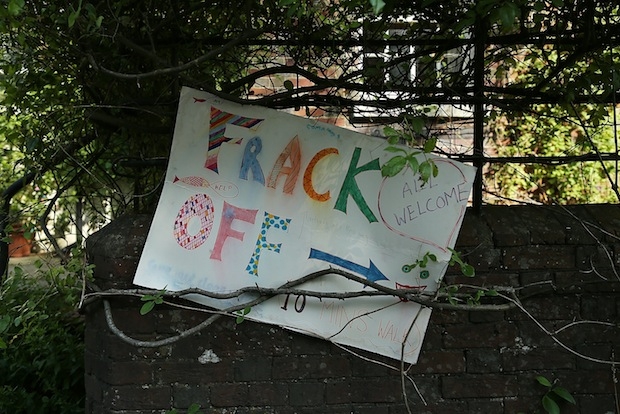The fracking debate has been brought to a new heat by David Cameron’s message to Home Counties nimbyists and eco-crusties that he wants ‘all parts of our nation’ to share the shale gas bounty, not just lucky northerners. But the argument is proceeding in almost total ignorance of how the controversial extraction technique works and how soon it’s likely to happen. So I asked one of Britain’s top energy executives this week whether shale is really the game-changer it’s fracked up to be. It certainly looks that way in the US, he said, because gas-based energy costs have been cut by two thirds, energy representing 10 per cent of all production costs. But the US has three built-in advantages: 2,000 land drilling rigs already in place; an extensive network of pipelines; and ‘if you own the land you own the mineral rights’. In the UK and Europe, ‘We don’t have 2,000 land drilling rigs, we’re not criss-crossed with pipelines, and unless you’re Latvian, you don’t own the mineral rights if you own the land. So it’s going to be a lot slower over here.’ And what should worry us most, he added, is that there’s a formidable competitor to the east that has plenty of shale and plenty of drilling rigs and can fix the ownership of mineral rights any way its autocratic government wants. The bad news if the nimbyists don’t back off is that Beijing will reap this bonanza long before Blackpool or Balcombe get a look-in.
Escape velocity
Hard to keep track of so many positive economic indicators. Growth was 0.6 per cent in the second quarter and may be revised upwards; it’s now likely to beat 1 per cent for the year and should head towards 2 per cent next year. Exports are well up, and non-EU exports, particularly to China and India, have achieved a quantum leap in the past five years; manufacturing output is improving, and the trade deficit in goods is reducing. The construction sector grew 1.4 per cent in the quarter, and the much-quoted Purchasing Managers’ Index registered a super-optimistic 60.2 in July (50 is neutral), up from 56.9 in June. Retailers reported their best July since 2006, and so did the services sector; employment data remains strong, and the private sector is clearly in the driving seat. The phrase ‘escape velocity’ has crept into pundits’ vocabulary, meaning a rate of recovery sufficient to build its own momentum. Even the negative news — a 5.5 per cent fall in UK real wages during the recession, compared with increases in France and elsewhere — is a positive indication of increased competitiveness. OK, there’s one positive that’s also a negative: rising house prices, at their steepest in central London, which I fear signal another debt-fuelled boom ahead. But to gloomsters obsessed with the wider dangers of cheap money and quantitative easing, who say this is ‘the wrong kind of recovery’ and is bound to end badly, I say: give it a rest, chaps, let’s just enjoy the novelty of feeling better.
Unalterable guidance
I’m looking forward to our readers’ tea party next month, and I know the question I’m most likely to be asked by the throng: ‘How is your much-missed predecessor Christopher Fildes?’ The great man is in good form, I can report, and regularly submits snippets for this column on historic railway postcards. This week he drew my attention to an early example of ‘forward guidance’, the technique adopted by Governor Mark Carney to reassure markets that the official interest rate will not budge from 0.5 per cent until unemployment falls below 7 per cent — unless inflation suddenly kicks off again, that is. In May 1971, Richard Nixon’s Treasury secretary, the Texan John Connally, planned to end a speech to an international bankers’ conference in Munich by declaring that he wanted ‘without any arrogance or defiance to make abundantly clear that we are not going to devalue [and] we are not going to change the price of gold.’ Paul Volcker, Connally’s under-secretary for monetary affairs who was later chairman of the Federal Reserve, queried whether his boss should be quite so unequivocal. ‘That’s my unalterable position today,’ Connally replied without hesitation. ‘I don’t know what it will be this summer.’ Three months later, he announced the end of the fixed dollar price of gold and an 8 per cent devaluation.
Auld Alliance
This dispatch comes to you from Normandy — no opportunity so far to exchange ideas for economic revival with holiday-making François Hollande — en route to the Dordogne. But before I left for France I took a detour to Edinburgh, not to test my stand-up routine on the Festival audience but to eat lobster and turbot at Martin Wishart’s restaurant beside the Water of Leith. It was superb, and the French-polished service made it memorably Euro-cosmopolitan. On the train north and south, I read Greek-onomics, Athens-born Vicky Pryce’s guide to the misfortunes that overcame her native country as a small, ill-managed economy with an inflated sense of entitlement on the periphery of the EU. Book, wine, sunshine and multinational tourist crowd all imprinted one thought in my mind: the Scots would be mad, utterly mad, to vote for Alex Salmond’s independence bid in next September’s referendum. As a devolved region of the world’s sixth largest national economy (on track to overtake France for fifth place, but that’s another story), with all the connections of a North American diaspora as well as the Auld Alliance and with fiscal largesse from London under the Barnett formula, Scotland today is in a blessed position. As Salmond’s fantasy fiefdom, it would be more vulnerable even than Greece, which at least bolstered its significance by blagging euro membership. Betting and polling say Salmond won’t win, but his propaganda will be all over the airwaves for the next year: sensible Scots should tell him to stick it up his kilt, and I’ll join them for another fine lunch when the No vote comes in.







Comments